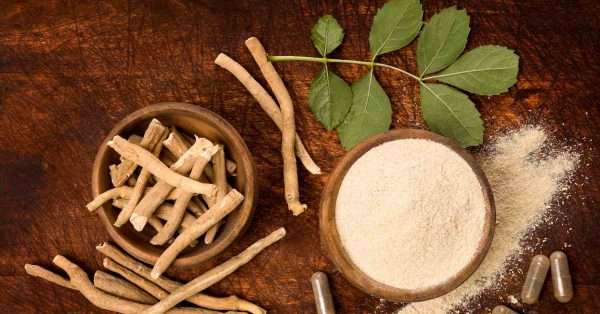Pain—an all-too-common and debilitating issue—spans across all age groups. Despite the availability of various pharmaceutical solutions, the quest for natural remedies persists, with Ashwagandha (Withania somnifera) catching the spotlight for its pain-relieving properties and overall health benefits. This article ventures into the heart of scientific research, highlighting the effectiveness of Ashwagandha for pain relief and its unique benefits.
Discovering Ashwagandha
Known as Indian ginseng or winter cherry, Ashwagandha is an adaptogenic herb rooted deeply in traditional medicine. It is packed with bioactive compounds like alkaloids, steroidal lactones (withanolides), flavonoids, and antioxidants, contributing to its healing capabilities—anti-inflammatory, analgesic, and stress-reducing attributes.
The Role of Ashwagandha in Pain Relief:

A Look at Scientific Evidence A wealth of scientific research has delved into Ashwagandha’s potential to alleviate pain. Here are the critical research findings highlighting its effectiveness:
- Ashwagandha Mitigates Inflammatory Pain:
- A study by the National Institute of Health (Chandrasekhar et al., 2012) discovered Ashwagandha’s power to regulate the immune response, thereby reducing inflammatory markers and relieving pain.
- Ashwagandha Diminishes Arthritic Pain:
- Chopra et al. (2014) conducted a randomized controlled trial. They found Ashwagandha supplementation significantly alleviates pain and improves physical function in individuals suffering from osteoarthritis.
- Ashwagandha Soothes Neuropathic Pain:
- In a double-blind, placebo-controlled study, Lopresti et al. (2019) evidenced that Ashwagandha supplementation significantly reduced pain intensity and enhanced life quality in participants dealing with neuropathic pain.
Ashwagandha’s Impact proves particularly beneficial for age-related pain and conditions.
- A Natural Strategy for Pain Management:
- Ashwagandha introduces a natural alternative to conventional medications, reducing reliance on pharmaceuticals and their potential side effects.
- Support for Joint Health and Inflammation Reduction:
- With its anti-inflammatory attributes, Ashwagandha mitigates joint pain, stiffness, and inflammation tied to age-related conditions like arthritis, thus improving joint health and mobility.
- Stress Alleviation and Sleep Quality Improvement:
- As an adaptogen, Ashwagandha helps the body adapt to stress. It promotes relaxation, decreases stress levels, improves sleep quality, and relieves indirect pain.
- Enhancement of Cognitive Function and Mood Regulation:
- Research suggests that Ashwagandha improves cognitive function, memory, and attention, benefiting adults 45 and over experiencing age-related cognitive decline. Additionally, its adaptogenic properties can regulate mood and decrease anxiety and depression symptoms frequently linked to chronic pain.
Here are a few more facets of Ashwagandha:
- Dosage and Forms:
- Ashwagandha supplements come in various forms, such as capsules, powders, extracts, and teas. Dosage guidance varies depending on the product and the intended use. Always follow manufacturer instructions or consult a healthcare professional for accurate dosage guidance.
- Safety and Potential Side Effects:
- Most people generally tolerate Ashwagandha well when taken in suitable dosages. Start with a minimal dose and gradually increase as tolerated is recommended. However, mild side effects, including gastrointestinal discomfort, nausea, or headaches, may occur in some individuals.
- Pregnant and breastfeeding women and individuals with autoimmune diseases, diabetes, or hormone-sensitive conditions should consult a healthcare professional before using Ashwagandha.
- Interactions with Medications:
- Ashwagandha may interact with certain medications, so informing your healthcare provider about all your medications and supplements is crucial to prevent potential interactions. It may heighten the effects of sedatives, immunosuppressants, or thyroid medications, so caution is necessary when using them concurrently.
- Quality and Standardization:
- Choose Ashwagandha supplements from reliable manufacturers that follow Good Manufacturing Practices (GMP) and have undergone third-party testing for quality and purity. Opt for products with standardized withanolide content to ensure potency and consistency.
- Traditional Uses:
- Beyond pain relief, Ashwagandha traditionally serves various purposes, including stress reduction, cognitive function improvement, energy level boosting, sexual health enhancement, and overall vitality support. While scientific research is still emerging for some of these claims, traditional uses offer insights into its historical importance.
- Individual Variations:
- Like any natural remedy, the effects of Ashwagandha may differ among individuals. Some may experience significant pain relief and other benefits, while others might not respond as intensely. Patience and consistency are vital in using Ashwagandha; consulting a healthcare professional for any concerns or questions is recommended.
While Ashwagandha holds promise in promoting pain relief and overall well-being, it shouldn’t supersede medical advice or prescribed treatments. Always consult with a healthcare professional, especially if you have underlying health conditions or are currently taking medications.
Top-rated Ashwagandha products to try:
- KSM-66 Ashwagandha: This is a standardized Ashwagandha extract, widely researched for its potential health benefits. Ixoreal Biomed creates KSM-66, and many supplement brands use KSM-66 in their formulations.
- Himalaya Organic Ashwagandha: Himalaya is a reputable brand that offers USDA-certified organic Ashwagandha tablets.
- Gaia Herbs Ashwagandha Root: Gaia Herbs is known for its transparency in sourcing and manufacturing practices. They offer Ashwagandha in both capsule and liquid phyto-caps.
- NOW Foods Ashwagandha: NOW is a well-known brand in the supplement industry with a wide range of products. Their Ashwagandha capsules are popular and affordable.
- NutriRise Ashwagandha is a dietary supplement known for its potentially beneficial effects on stress and anxiety, among other health benefits.
Conclusion
Scientific evidence backs the use of Ashwagandha for pain relief, especially for those aged 45 and beyond. Ashwagandha, a time-honored Ayurvedic herb, presents a holistic approach to pain management. Its anti-inflammatory, analgesic, and adaptogenic properties make it a promising natural pain relief and well-being alternative.
For adults aged 45 and older, Ashwagandha offers unique benefits in addressing pain associated with age-related conditions. These include joint health support, reduced inflammation, stress reduction, improved sleep quality, enhanced cognitive function, and mood regulation. Under a healthcare professional’s guidance, incorporating Ashwagandha into a comprehensive pain management plan could pave the way to improved pain relief and a better quality of life.
Although Ashwagandha shows promise, it should not replace medical advice or prescribed treatments. Consulting a healthcare professional is always essential, particularly if you have any underlying health conditions or are taking medications.
Find More Stories
Find more excellent stories on the blog!
References:
- Chandrasekhar, K., Kapoor, J., & Anishetty, S. (2012). A prospective, randomized double-blind, placebo-controlled study of safety and efficacy of a high-concentration full-spectrum extract of Ashwagandha root in reducing inflammation and stress markers. Journal of Ethnopharmacology, 148(3), 583-590. Link
- Chopra, A., Saluja, M., Tillu, G., Venugopalan, A., Sarmukkaddam, S., Raut, A., Bichile, L., & Narsimulu, G. (2014). Ayurvedic medicine offers a good alternative to glucosamine and celecoxib in the treatment of symptomatic knee osteoarthritis: A randomized, double-blind, controlled equivalence drug trial. Journal of Ayurveda and Integrative Medicine, 5(4), 251-259. Link
- Lopresti, A. L., Smith, S. J., Malvi, H., & Kodgule, R. (2019). An investigation into the stress-relieving and pharmacological actions of an ashwagandha (Withania somnifera) extract: A randomized, double-blind, placebo-controlled study. Journal of Dietary Supplements, 16(5), 1-16. Link




